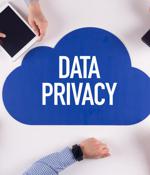Security News

Expert: Information management can also lead to a massive value proposition in being able to tap into governed data for business insights. TechRepublic's Karen Roby spoke with Kon Leong, CEO and co-founder of ZL Technologies, a data management company, about data privacy and governance.

72% of consumers said they would be uncomfortable purchasing insurance without speaking to a human being, and 64% would be uncomfortable filing claims on a website or app without human interaction. The survey also found that consumers value privacy more than potential savings.

Using data gathered by its Privacy Checker website, Kaspersky has been able to pinpoint areas of concern for visitors seeking to improve their privacy posture. Using data gathered over nearly two years, Kaspersky said that its Privacy Checker website indicates that most visitors are concerned over mobile operating system privacy and the privacy of their data captured by Google.

Lawyer who specializes in data privacy discusses the importance of knowing the law no matter what size business you operate. TechRepublic's Karen Roby spoke with Catherine Zhu, special counsel at Foley & Lardner, about the changing landscape of data privacy laws.

Every size company should know the laws regarding data privacy to avoid legal issues. Here's why it's important.

A report released Tuesday by KPMG looks at the growing concerns among consumers about data collection and offers advice for businesses on how to address those concerns.A third of them said that consumers should be more concerned about how their data is used by their company, while 29% admitted that their company has sometimes used unethical means to collect private data.

A judge in South Carolina has struck out a number of claims in a consolidated class-action suit alleging cloud CRM provider Blackbaud didn't do enough to prevent a 2020 ransomware attack, but allegations under California's Consumer Privacy Act will move forward. US district judge J Michelle Childs said in a 33-page ruling [PDF] that "Blackbaud's alleged registration as a 'data broker' suggests that it is also a 'business' under the CCPA." The firm had previously argued it did not qualify as a "Business" regulated by the CCPA, California's GDPR-ish data privacy regulations that came into effect in July 2020.

Too many of these - there's a threshold - and Apple's systems will let Apple staff investigate. In a blog post "Recognizing People in Photos Through Private On-Device Machine Learning" last month, Apple plumped itself up and strutted its funky stuff on how good its new person recognition process is.

Well, according to Apple, "Mail Privacy Protection stops senders from using invisible pixels to collect information about the user. senders from knowing when they open an email and masks their IP address so it can't be linked to other online activity or used to determine their location." Marketers' ability to deliver those experiences relies on these metrics and, due to Apple's Mail Privacy Protection, marketers will no longer be able to deliver those personalized and engaging email experiences for subscribers.

Released on August 10, Firefox 91 delivers HTTPS by Default in Private Browsing mode and an enhanced cookie clearing option. "While there remain many websites that don't use HTTPS by default, a large fraction of those sites do support the optional use of HTTPS. In such cases, Firefox Private Browsing Windows now automatically opt into HTTPS for the best available security and privacy," Mozilla explained.